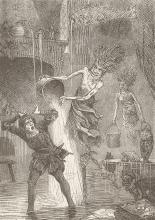"For my first honours project at UW, I wanted to do something related to translation, for I wanted to work as a translator after graduation. I especially wanted to challenge myself, and so I chose to translate Goethe's Der Zauberlehrling, which is about a wizard's apprentice who learns the hard way that magic is not to be trifled with. It is a ballad written in fourteen stanzas with an unusual rhyme scheme, and I knew it would be difficult to achieve a rhyming version in English that also retained Goethe's economy of language. But I loved the poem; to quote Frank McCourt, it "was like having jewels in my mouth" to recite the words either silently or aloud. As a die-hard fan of the medieval period, I also loved the poem's medieval subject matter, magic. I view Der Zauberlehrling as the amalgamation of a beloved subject matter, medievalism, and a beloved literary figure - hence, as both irresistible and intensely interesting.
Der Zauberlehrling was published in 1797, only fifteen years after Anna Göldi entered history as the last person in Europe to be executed for witchcraft. Noteworthy is the juxtaposition of a public trial and execution on the basis of witchcraft, and the lingering Classicism of that time; clearly German and, in a larger sense, European culture were in a state of transition, and correspondingly awash in conflicting ideas, both medieval and modern. Within my translation I wanted a backbone of modern language draped in both medieval language and Shakespearean language, with the latter serving as a bridge between the translation's medieval and modern elements. The finished result is, or I hope it is, a lively modern interpretation with manifest medieval spice.
My translation of this poem is not without flaws. Nonetheless, I am proud of it. It represents many hours of work - nearly the same amount of effort I would have put into another class! I fretted over word choice and agonized over rhyme, and worried that I wasn't paying proper homage to Goethe, who I consider to be Germany's answer to the Bard. In the end, I realized that the final translation per se wasn't important; it was the journey to that point that mattered."
Laila Collins, 2016
Adviser: Jason Groves, Reprint with permission only Ⓒ
